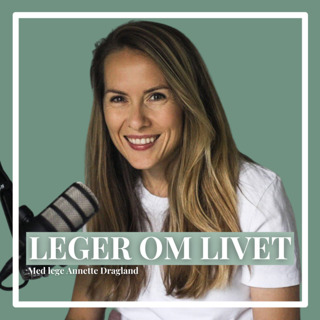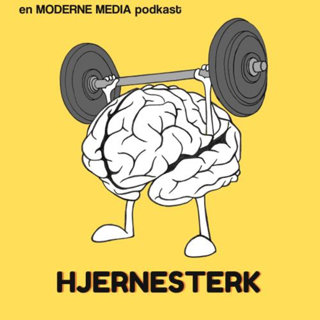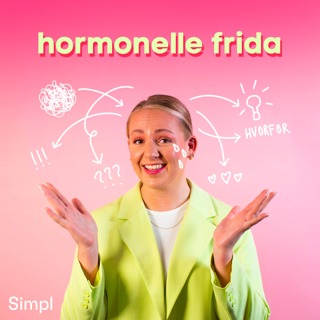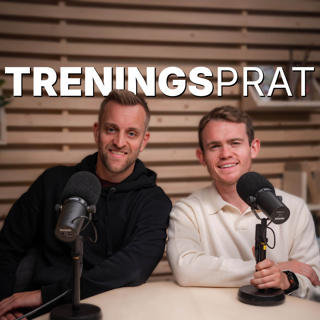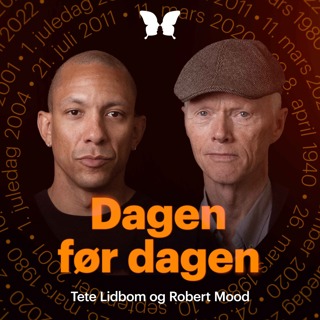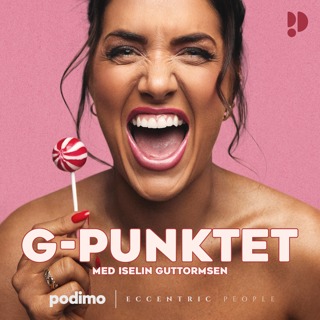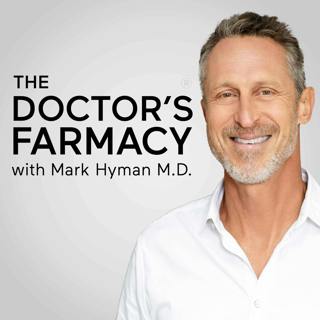
How Chefs Can Be Doctors, and Doctors Can Be Chefs with David Bouley
Many of us are in the middle of an identity crisis when it comes to what we eat. We’re pulled one way or another about macronutrients and labels, all the while missing the most important concept of all: food is medicine. We can align our foods to feed our health and get incredible flavor and variety all at once. We can cook our way out of illness and overcome the fear and overwhelm of dietary choices by getting more personal with our kitchens. There’s no one better than the world-renowned Chef David Bouley to dive into this topic with— he’s this week’s guest on The Doctor’s Farmacy. Among many accolades, Bouley earned several four-star reviews in The New York Times; seven James Beard Foundation awards for best restaurant and best chef; he was named “Best Chef in America” by Herald-Tribune; he received the TripAdvisor Traveler’s Choice Awards “The Best Restaurant in the United States” and #14 in the world; a 29 out of 30 rating in Zagat, and ranked #1 in New York City for many years. Chef Bouley is known as one of the most health-conscious chefs in the world, with a strong focus for diners with health concerns. He is currently contracted for a new book, Living Pantry, that will provide the building blocks for home cooking to deliver great taste and health benefits with easy execution.
10 Jul 20191h 7min

How the Food Industry Targets Children
Our children are being bombarded by powerful marketing messages from the food industry promoting unhealthy processed food-like substances. In fact, the food industry spends billions of dollars on marketing junk food to our kids every year. The average child in the United States sees over 6,000 ads for junk food and soda on TV and even more through social media. And poor and minority children are targeted more aggressively. In this mini-episode of The Doctor’s Farmacy, Dr. Hyman speaks with researcher and family physician in the Bronx, Dr. Sean Lucan, and investigative reporter and Pulitzer Prize winner, Michael Moss, about Big Food’s addictive mission to hook the most vulnerable consumers - our children - and keep them coming back for more. You can find Dr. Hyman’s full-length conversation with Dr. Sean Lucan at https://DrMarkHyman.lnk.to/SeanLucan You can find Dr. Hyman’s full-length conversation with Michael Moss at https://DrMarkHyman.lnk.to/MichaelMoss
5 Jul 20199min

Are we eating too much (or not enough) protein for good health? with Dr. Gabrielle Lyon
These days, we hear a lot about carbs versus fats. But what about protein? It’s become the forgotten macronutrient. The diet-wars have been tough on protein, as strict vegans and believers in Paleo strongly disagree on the best forms of it to consume. But protein plays an essential role in good health. So despite the emotional response it elicits in many, it’s about time we pay it more attention. Protein is responsible for the growth and maintenance of new tissue (the building blocks for a strong body!) and makes up certain hormones that act as messengers, as well as the enzymes that we need for metabolic reactions. Today on The Doctor’s Farmacy, I talk with Dr. Gabrielle Lyon about the importance of protein and why we should shift our dietary focus. Dr. Gabrielle Lyon is an integrative physician who completed her fellowship in Nutritional Sciences and Geriatrics at Washington University, St. Louis. She is board-certified in Family Medicine and completed her undergraduate work in Human Nutrition Vitamin and Mineral Metabolism. Dr. Lyon works closely with current and retired Special Operations military operators as a part of the Task Force Dagger Foundation. Find more information about Dr. Gabrielle Lyon at her website https://drgabriellelyon.com/ Learn more about Dr. Lyon’s work with taskforcedagger.org
3 Jul 201956min

Does Your Immune System Listen To Your Thoughts?
Emerging research is giving us a more comprehensive picture than ever before about the way our mind can impact our health. While science continues to reveal the dramatic impacts of stress on the immune system, more and more clinical research is also emerging around topics such as the immunology of joy and the immunology of gratitude. In this mini-episode, Dr. Mark Hyman speaks to Dr. Leonard Calabrese, an expert in immunology and rheumatology, about how the right practices to support these areas of life actually improve the immune system. Dr. Leonard Calabrese is a Professor of Medicine at the Cleveland Clinic Lerner College of Medicine of Case Western Reserve University and Vice Chair of the Department of Rheumatic and Immunologic Diseases. He is the director of the RJ Fasenmyer Center for Clinical Immunology at the Cleveland Clinic and holds joint appointments in the Department of Infectious Diseases and the Wellness Institute. Dr. Calabrese has made significant contributions to science in the fields of chronic viral infections and autoimmunity and vascular inflammatory diseases of the brain. He has received numerous awards and honors for his contributions to the advancements of immunology and wellness. You can find Dr. Hyman’s full-length conversation with Dr. Calabrese here: https://DrMarkHyman.lnk.to/DrCalabrese
28 Jun 20197min

How Do Psychedelics Help You Reach Enlightenment or At Least Happiness? with Michael Pollan
As we see the amount of information and technology we have access to growing, we also gain a stronger view of universal human tendencies that are overarching in time and culture. One of those that is particularly fascinating is our desire to change consciousness, to alter our brain and our mood, whether it’s with drugs, food, or even activities like meditation and breathwork. That’s one of the many reasons the emerging research on psychedelic-assisted psychotherapy is so interesting, especially considering it was completely written-off for decades after getting a bad rap in the 60s, despite having shown therapeutic promise in the 50s. Today on The Doctor’s Farmacy, I’m joined by world-renowned author Michael Pollan to talk about the exciting reemergence of psychedelic therapy and the possibilities it holds for the future of healthcare. Michael Pollan is the author of the New York Times bestsellers Cooked, Food Rules, In Defense of Food, The Omnivore's Dilemma, The Botany of Desire, and his latest book How to Change Your Mind, which is all about the new science of psychedelics.
26 Jun 20191h 6min

The Ground-Breaking Study You Haven’t Heard About
Ketogenic diets have gained significant popularity in the mainstream. However, ketogenic diets have actually been around in medicine for a long time. For example, they are used for treating intractable epilepsy when medications fail. Yes, that’s right, when meds fail we use food! Now mounting research has also found them to be effective in reversing type 2 diabetes, a disease previously thought to be non-reversible. Diabetes expert Dr. Sarah Hallberg has studied the impact of a low-carb, high-fat diet (essentially a ketogenic diet) in treating type 2 diabetes. Her results have been ground-breaking yet largely overlooked by mainstream media and the medical community. Why is this? In this mini-episode of The Doctor’s Farmacy, Dr. Hyman explores this question with author, researcher and executive director of the Nutrition Coalition, Nina Teicholz and also talks to Dr. Sarah Hallberg about her research and the importance of acknowledging that type 2 diabetes reversal is possible. To listen to Dr. Hyman’s full-length conversation with Nina Teicholz visit https://DrMarkHyman.lnk.to/NinaTeicholz To listen to Dr. Hyman’s full-length conversation with Dr. Sarah Hallberg visit https://DrMarkHyman.lnk.to/DrSarahHallberg
21 Jun 201910min

Do You Dream Big Enough for Your Life? with Jon and Missy Butcher
We don’t have any control over the cards we’re dealt, but we do have control over how we play them. Part of playing those cards right is believing we can have everything we want and figuring out exactly what it takes to get there. This week on The Doctor’s Farmacy, Jon and Missy Butcher sit down with me to talk about their program Lifebook, that helps others do just that. And it really works! I’ve personally gone through their system to bring my own vision of a happy life to fruition and upend limiting beliefs and it’s changed my life in unbelievable ways. Jon and Missy are artist-entrepreneurs whose life together revolves around their amazing relationship, family, and work. Together, they have founded over a dozen companies, all organized around causes that matter. Their purpose and mission is to create the highest possible quality of life they can for themselves and the people they love while helping others around the world to do the same. To learn more and to enroll in Lifebook Online, please visit https://go.mindvalley.com/mark
19 Jun 20191h

Why You Should Avoid Sweet Fat
Many of us were taught that eating dietary fat makes us fat and leads to heart disease. This assumption has been catastrophic for our health. In fact, fats are essential for optimal health, and saturated fat, specifically, is not the boogeyman we once thought. We know now that there is no monolithic saturated fat. There are many saturated fats, each with its own effects. The saturated fat in coconut, for instance is different from the saturated fat in butter. In this mini-episode, Dr. Hyman talks with neurologist Dr. David Perlmutter about how saturated fat came to get such a bad rap. They dive into many of the ways the right saturated fats are beneficial to your health and discuss why, what Dr. Hyman calls “sweet fat,” is so harmful. *A Note on Fat: While a high fat diet does not work for everyone, we now know that fat is not the enemy it was previously made out to be. Some people do well with less fats and some do better with more fats. It is important to determine what work specifically for your body. **Please also note, we caught an error in the narration at the end of this episode. The final message is, "The kind of fat you eat is what matters most. Focus on eating a diet of whole foods and avoid processed junk. To hear Dr. Hyman’s full length interview with Dr. David Perlmutter please visit https://DrMarkHyman.lnk.to/DrDavidPerlmutter
14 Jun 20195min




